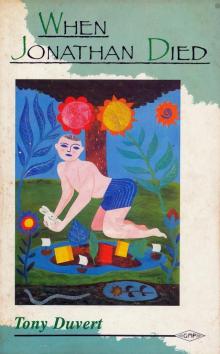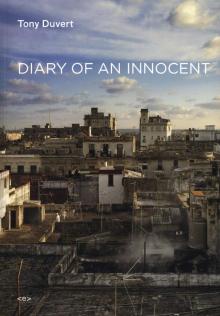- Home
- Tony Duvert
Diary of an Innocent Page 4
Diary of an Innocent Read online
Page 4
Because each person exploits the rules of society differently, I was at least hoping to meet those who didn’t apply them to me to a high degree. It’s not something easy to assess, and it’s determined to a great degree by the situation. I avoided the flashy ones, with their gift for gab and their mediocre performance in bed. As a rule I stayed away from homosexuals, who seemed to me to be fearful, hounded, possessive and underhanded. I didn’t know any adult—I’m enough of that for my purposes. Lastly, my needs and habits kept me away from the upper and lower-middle classes, as well as from students and other foreigners. But I was able to enjoy some pleasant company now and then; not all of it was short-lived.
My life, then, consisted of living the intermissions of others, their brief lapses from being normal. Here is where I shed my identity as a homo; those who came over weren’t, and they didn’t want to be; myself, even less. I stopped feeling any difference between us since they didn’t bother establishing one; I felt like I was with my kind of people. Just an illusion, to which this book is dedicated. I wouldn’t be able to explain who these boys or their city were; I can only gather up what slipped out of them, collect what they cast out of their existence like an excrement, which is the best of my life.
As for the wilder pleasures, I obviously wasn’t giving them up. Night and quiet alleyways favored these furtive couplings. I took them the same way anyone does: as nasty, exciting, coarse, puritanical, inevitable. Moreover, I had a liking for them. When it came to morals, diversity—from the brusquest to the softest, from the purest to the most far out—worked better for me than a single rule for living, no matter how perfect it was considered. And since I approve of a hundred different ways of being, the only thing that works for me is to adopt a little of all of them, based on the company I seek.
Pedro went to school on a regular basis but wasn’t interested in studying. He did it to avoid being beaten. I don’t know what he liked. He didn’t talk very much about himself or anything else and seemed to possess no perceptions, opinions or feelings. I saw him once or twice a week, irregularly, for several months. He never stayed more than an hour. From beginning to end, he was a crude, undecipherable object, sixty-five pounds of childlike flesh piloted by a mulish mind, lacking both meanness and affection. He often brought his schoolbag and let me look inside it. But the notebooks, besmirched as they were by the ink of a ballpoint, were as uncommunicative as he was: collections of chores, a testimony to the boredom of going to school. When adults were around, Pedro, who envied their power, was like one of those unsocial kids who hide their face if a photographer approaches. He refused to be commandeered, handed over to another, captured in effigy; the injustice of a photo comes from its author being able to look at you in it without your being able to look at him.
When it came to our pleasures, there was nothing to discover; he smugly put his restrained good will into them, and I didn’t push it. No fantasy, no embarrassment, just a rather clumsy sensuality that had conviction and was kindly, solid and cold-blooded.
He had good understanding and judgment; and though his movements were a bit sluggish, he’d warm up when the time came. Nevertheless, on that day with the apple, when Pedro s theft was hidden under his balls, it surprised me that he hadn’t stopped me from sliding a hand down there. When he was with his brother, playing it circumspect became an invincible ostentation. But he wasn’t worried, stayed calm and didn’t even press his thighs together, which other children would have done out of simple embarrassment about someone wanting to touch their anus.
In blue fountain pen ink, he once drew me a man, a woman and a little boy, each on a half sheet of stationery. The figures were laid out on the page so evenly that it was almost shocking, given how instantaneously he did it: centered exacdy, neither too large nor too small, in frontal view, broad and square like the figures on a deck of cards, left and right sides completely symmetrical.
First he made the man, which he liked doing. The lines are spare, emphatic, carefully executed; the drawings are so frankly oversimplified that they don’t seem awkward. The man has curly hair on an oval head; an elegant mustache ending in curlicues; attractive, almond-shaped eyes; round, clear pupils; a sweet look. A U with long, curved serifs forms the eyebrows and nose, pierced by two small nostrils that give him a mischievous expression. The even mouth is closed, unsmiling; a fat cigarette hangs crookedly from it with the smoke rising in an oblique tendril. His trunk is a square, decorated with buttons between two vertical lines. Appropriately large tentacles form the arms; one of those rubbery arms has been raised to the height of his head to wave hello, in a gesture that’s a bit patronizing, indifferent.
When Pedro had to draw the hands, he hesitated; he looked for a moment at his before doing the man’s. A tube for the wrist, a circle for the palm and very well-proportioned little sausages for fingers. The man has a weird pair of trousers: the hips are triangular like a simplified pair of briefs, placed on two parallel, fairly long cylinders, spread far apart from each other, with shoes pointing to the left. Later, when Pedro had drawn the woman, he added genitals to the guy, on top of his briefs: a straight rod with no balls, hanging at a slant. The hair at its base is indicated by a bold ring of ink; a circle on the other end represents the head. That rod has been drawn and positioned exactly like the cigarette, but the cigarette is fatter, and the circle at the end stands for the ash.
I wanted the woman to be nude. He reduced her to the essentials: long hair with a middle part, blank eyes, a lipless mouth, dangling arms, cursory fingers. A square for her torso, the inevitable line that separates the top and bottom of the body at the waist, then the triangle of the hips, with no feminine outward curve; however, between her thighs, the apex is rounded to the shape of a donkey’s belly. In its middle is an oval hole surrounded by some playful hairs that radiate out like a hedgehogs when it’s rolled up into a ball. Her bare feet have three and four toes.
At that point, I told Pedro that he’d left something out of his woman. He didn’t agree, but looked for it anyway, in vain. I pointed to her chest—there wasn’t anything there. He let out a scatterbrained laugh and began drawing the bosom. It started with two round spirals; then, hanging from each, a kind of pocket or pear or sock, which he finished with a long nipple end. It called to mind a limp version of those drooping one-scoop ice-cream cones, rather graceful-looking in their fashion as breasts.
A lot of boys older than him who came to my place had scrawled pictures of naked women and had also left out the breasts, which seemed to be banished from their graphic tradition. Pedro had to make an effort at being inventive, and without getting distressed; because it left him cold, he overdid his bright idea that much more; he had to do his best with the details to be sure of reproducing what I was asking for.
He doesn’t want to draw a child, but I insist. The woman was fun, the man flattered him, the little boy means nothing, except perhaps an unpleasant flashback to the time when he was one. Pedro’s aware of social norms, puts up with them, applies them rigorously; he’s still at the age where you think you only need to grow up to escape outside control; like almost every child, he’s sacrificing himself to the adult he wants to be, without imagining that such renouncing is destroying in advance the man he’ll become.
He had no experience drawing boys, no stereotype for it. But after much hesitation, he unearthed a memory from a schoolbook that guided him—the image of a schoolboy in a beret, the type you don’t see around here, which he interpreted in his own way. The beret is immensely enlarged, the sides enormous, a stem sticking up from the middle like a felt tassel; it looks like a clog with two feet. The hair is swallowed up by this hat, the ears sticking out; the man and woman had none. These ears are beautifully drawn, like half-daisies, with a small hole in the middle. Pedro added the very extended U that represents the nose and eyebrows, botched a crooked mouth and lifeless arms, then called up his memory of school again to draw the bottom part of the body, trousers with a fly, placed over hips that aren
’t a triangle this time but loins, wearing rather realistic briefs of loose material over a concave crotch.
I told him to draw the boy again, but naked. This new piece of work, drawn in a corner of the sheet of paper, was composed, obliging, assiduous. Pedro looked at and touched himself for reference, perhaps a sign that he’d accepted identifying with what he was depicting; it wasn’t like the sullen discomfort evinced while drawing the schoolboy in underpants.
Since his own pectorals were quite pronounced, he gave the little boy a bosom by drawing two C’s, the opening of which pointed downward, whereas the curve faced up; according to Pedro, therefore, the difference between the breasts of a man and the breasts of a woman were that the former rise and the latter fall. But I’ve seen the same detail in the graffiti of my other visitors. And since they put nothing where a woman’s breast should be, the males seem to incarnate the organs of both sexes at the same time, and the females to be nothing but boards with a hole.
I also find the insistence on pectorals striking because the teenagers I knew had muscular, wiry bodies, which weren’t skinny but were without significant volume. Chests like a flattened cylinder, very narrow hips; smooth, beautifully shaped limbs; slender hands; exquisite hairless skin shaped by the most delicate contours of the flesh, as if by Cellini. But they wanted to be thickset, heavy, solid. Despite this, I’d never seen boys as good-looking, or so many of them, combining so much grace, looseness and ease with perfect stature and such attractive faces—with very dark brows, harmonious bone structures, smooth cheeks, flawless chins; daydreamers with defined lips and pearly white teeth as transparent as those in childhood; hazel, ebony, steel-gray eyes with thick eyelashes, curly eyelashes, beaming with vivacity and sweetness, characteristic of a lower class type that’s almost universal and can also be found in Paris among teenagers from poor neighborhoods who are too well put together, handsome without wanting to be, and thrown into a rage if a queer looks at them. What they fleetingly possess is that archaic beauty, just as their language—in its incorrect constructions, slang, accent, rhythms and inventions without rules—conserves traces of periods when French was a living language that was created communally and served the art of speaking in a real way. And in the same way that their listening to the radio and watching television makes them correct this bountiful way of speaking into stammering malapropisms, into an ignorant, hoity-toity, petit-bourgeois mass media style that is hackneyed, curt, bled dry, maimed, and stuttering, so do they repress that part of their attractiveness that makes them feel inferior, deriving from it a mask of servility, triviality and spite.
Nothing like that here. However, the boys never think they’re manly enough and spurn their own perfection because they see no sign of power in it.
Therefore, when they drew, they gave themselves an emphatic chest and went to lift weights in the grimy gyms in their neighborhood. As soon as they had hair on their body and face, they shaved it off, hoping this would make it grow more, that it would get blacker, thicker, straighter. After a few years, the most determined, now hairy and mustachioed, with a hardened jaw, cold expression, rugged shoulders and an arrogant walk, would take on the unsettling appearance of a plainclothes cop; all they lacked to make them look like they belonged in a bad film was a trench coat. They were adults now, made up to look like a lout to get their place in the sun and control their wives and brats.
Still groping himself under his sweater, Pedro added a few random lines to represent the stomach muscles. He forgot the navel. He managed to create the clear face of a dreamer, left out the ears (but not the enormous beret) and centered the dick precisely, making it identical to the man’s—dangling straight but without balls. A circle of ink sketched out the pubic hair. Pedro didn’t have any yet, but he liked to show me what he had by plucking out seven or eight brown hairs curved like the ringlets at the nape of a little girl’s neck, which lay there dormant without producing a shadow.
He signed the sheets of paper solemnly and emphatically, in firm, round horizontal writing, the letters slanting slightly backward, full of curlicues, in a deft, sufficiently pleasant, important-looking, placid hand.
These drawings offered an image of Pedro he didn’t project as a person. And into the perception I had of this child I would have liked to introduce the honest, emotionally moving view that his work revealed, which was shot through with nuances in spite of its caliber. It was like seeing a frozen tree in winter, an unimaginative plant with uniform branches and a geometry that is far from remarkable, which bloomed into beautiful, wholesome foliage, like an apple tree’s when spring came. Pedro, who was crazy for apples, was expressing something about himself when he hid one between his thighs. But I hadn’t known how to use it to discover the wonderful roundness he was made of, hearty and affable, bathed in a scent of fresh, plump flowerings, fleshly with a pulp that held no mystery, the ample flavor of a little peasant farmer.
It was when we first knew each other that he did his drawings. The following fall he disappeared, a short time after our reunion at the palm tree, when he was approaching thirteen and beginning to be able to produce some come. His family moved to another city, and I stopped getting news.
But around the same time, Francesco finally decided to invite me to his home, and I saw Pablos asleep, as I’ve described.
Obviously, I didn’t know it was Pablos. I went back the next day, they were inviting me to lunch. They showed me a little boy with a round, pretty face, energetic and dark, quite thin and very short (his mouth or chin must have been on a level with my navel). Then we left; it was the men who ate together. In the afternoon, he reappeared, sat down near me for a moment. He had a smilingly open face. And I heard his first and only words of that day, pronounced slowly and diligently, with a voice buried lower in his throat than is natural: “Are you happy?”
“Yes.”
He shakes his head, laughs. “Very, very happy?”
So, he was the one who had been asleep. He was so young that I didn’t dare realize how attracted I was to him. Instead, without result I teased one of his older brothers, who was thirteen and had large, flapping ears, a nice funny face; he was a little ugly, the rascal of the village under the dark cloud of puberty. His status in the family was disadvantaged; he was everybody’s servant and reacted awkwardly to signs of interest.
I didn’t really discover Pablos until later, when they were reckless enough after the soup to start pointing out the charms of the little ones. I let myself be tempted all the way; but I thought he was too young, was being brought up too strictly, was well-behaved and serious, I was only half-thinking about it.
Then a term went by without my seeing him. In Paris several times I shared a bed, some fooling around and some walks to school with a French lad of six or seven, which was something that had never happened to me. After that experience, Pablos would seem like a very big boy to me.
In fact, he’d hardly gotten any taller; but his willowy look had become more thickset and square, with a short neck, too much of a swayback and a belly that stuck out. You noticed it most in profile. A lot of little boys go through that phase of growth, during which they increase in width without the length catching up. All you can do is be patient.
From then on, Pablos looked vaguely like his mother, who had a low center of gravity and was nimble and as broad as a barrel, with her own brand of being a shrew. Those of her children who’d become adults were at least two heads taller than her, and as slender and nicely put together as she was round and midget-like. Furthermore, Francesco and Pablos had snatched some attractive features from her moon-face, which looked a bit Mongol, with wrinkly dewlaps and little sow’s eyes.
Pablos hadn’t gotten fat, it was just his frame. However, they made fun of his oversized belly and heavy behind. That was because he’d been thickened by a dozen undershirts, tee shirts, shirts, sweaters, shorts and pants that they put on him once winter came. He got cold easily.
One afternoon, I’d come over unexpectedly. They were
stripping the child down for his bath. They pulled off innumerable articles of clothing of ill-assorted sizes and colors, more or less worn out but still clean, and perhaps once attractive. Their mother, who was rather lazy, except when it came to cooking and eating, never mended anything; her sons’ wardrobes were a spectacular collection of rips and tears that the big sister drowned in bleach every eight days. Francesco had a friend, a boy tailor, living in a little room, where he went to get things mended. The little kids stayed unpatched, like a lot of children from poor neighborhoods; but that kind of neglect kept them from being harassed about their clothes; they could make a mess of them, tear them without having to worry.
Soon there was a mountain of rags, and a little man in boxers appeared, his shoulders bulging, his muscles gnarled, with skin pale and white like a cave-dwelling larva put under the light, and wide, flat abdominals that were as cut as the scales of a reptile; a slim bottom with a prominent crack; straight, muscular back and cute legs. They had him go into another room to take off his underpants. He’d been blase in my presence, neither upset nor calculating; in vain I searched his eyes for a sign that he’d noticed I’d been looking. I was surprised that he still let himself be dressed and undressed. But piling up his rags was a really complicated task; once it had been done, he kept it day and night for a week.
Three months later, Pablos thinks of himself as quite grown up; that fall he was nine, that winter he said he was eleven—I think he’s ten. A real change must have inspired him to exaggerate like that; in fact, he isn’t at all wild or brooding any more. The boy that’s blooming in him, which I’ll get the chance to know, who’ll be him on a daily basis, had only appeared in my sleeping boy of autumn like a promise or a passing fancy; he’s the one who’d asked me, Are you happy?

 Strange Landscape
Strange Landscape A Silver Ring in the Ear
A Silver Ring in the Ear When Jonathan Died
When Jonathan Died Diary of an Innocent
Diary of an Innocent